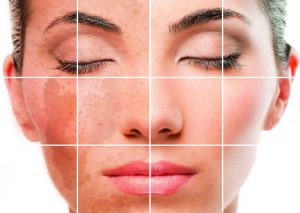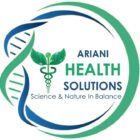Natural remedies for the skin
Written by Dr Arien van der Merwe, extracted from her book Health & Happiness, available from our health shop as book and eBook
Some of the micronutrients  and ingredients that contribute to keeping the skin young and healthy are discussed briefly. The guidelines for a healthy lifestyle also apply, namely healthy eating habits, plenty of water, stress management and exercise. Long term stress often manifests in skin diseases such as eczema, outbreaks of psoriasis, acne, nettle rash, and skin rashes (dermatitis). Smoking adversely affects the general condition of the skin and accelerates the ageing process.
and ingredients that contribute to keeping the skin young and healthy are discussed briefly. The guidelines for a healthy lifestyle also apply, namely healthy eating habits, plenty of water, stress management and exercise. Long term stress often manifests in skin diseases such as eczema, outbreaks of psoriasis, acne, nettle rash, and skin rashes (dermatitis). Smoking adversely affects the general condition of the skin and accelerates the ageing process.
The skin is the largest organ in the body and forms a protective layer between ourselves and the outside world. It protects us from environmental toxins, invasion by bacteria, fungi, parasites and viruses and mechanical injury. The skin regulates body temperature, excretes waste matter and is the main organ for the sense of touch. It must be well cared for and looked after. The factor that contributes most to ageing of the skin – let alone the risk of skin cancer – is over exposure to the sun. However, for optimal vitamin D production inside the skin, sun exposure on bare skin, is essential. Sun exposure of 30 minutes per day, within an hour of sunrise and before sunset, is highly recommended. Avoid excessive sun exposure in the middle of the day.
Many synthetic sunscreen and sunblock creams, as well as many other skin products, are harmful to the skin and should be avoided. Look out for parabens, liquid paraffin, mineral oils and other paraffin based ingredients, petroleum jelly and petrolatum, as these are all waste products of the petrochemical industry. Rather look for natural sunscreens and other skin care products.
Natural ingredients in sunscreens
Sunscreens all contain cocoa butter (a good moisturiser), para-amino benzoic acid (PABA is a B-complex vitamin that protects the skin from UV-B rays), sesame seed oil (protects against ultraviolet rays, but not enough for a light skin) and zinc oxide (offers complete protection against UV-A and UV-B rays). Research has also shown that supplements of beta carotene and lycopene (the red pigment in tomatoes) reduce sun damage.
Aloe vera contains vitamins, minerals, enzymes and proteins that relieve sunburn and other skin damage, and nourish the skin. Avocado oil and vitamin E nourish and protect the skin. Vitamin C protects the skin from sun damage and increases the levels of vitamin E.
Excessive exposure to sun dramatically reduces the skin\’s vitamin C content. Try to use a sunscreen that contains vitamins C and E. Many researchers claim that covering the skin with a synthetic sunblock can lead to reduced absorption of vitamin D. Vitamin D is important for the prevention of melanoma and basal cell carcinoma. In some cases sunscreens merely delay the sun damage; they do not really prevent it. Vitamin D in a sunscreen absorbs harmful free radicals, improves immunity and controls cell growth, an important factor in preventing skin cancer (such as melanoma and basal cell carcinoma). (Refer to chapter 10 for more information on the importance of vitamin D for health and wellbeing).
Apart from those already mentioned, herbal remedies that help to prevent sun damage, and treat irritated skin and bruises, include witch hazel (Hamamelis virginiana), milk thistle, cucumber and lavender. Try a sunscreen and sunblock that contains natural sun protection. Also take a general antioxidant combination with high doses of vitamins A, E and C for internal protection.
Alpha hydroxy fruit acids (AHA)
The alpha hydroxy fruit acids which, as the name suggests, occur in fruit are the only ingredients that have been scientifically proven to delay the ageing process and even to reverse it. This is particularly true of sun damage. AHA stimulates skin renewal and it is particularly good for dry skin. It has been used by dermatologists for many years for the treatment of adult acne and for age spots. Improvement is usually noticed within two weeks. The fruit acids most commonly used are malic acid (from apples), gluconic acid (from sugar cane), lactic acid and tartaric acid (from red grapes). Marine algae contain pyruvic acid and malic acid with long-chain polysaccharides which make the skin feel soft. Alpha hydroxy fruit acids are also combined with vitamins, minerals and herb extracts.
AHA works through a process of exfoliation of the skin and therefore thinning the outer layer (epidermis) of the skin. As a person gets older, the outermost layer of skin thickens, distorting the tissue beneath the skin and forming wrinkles. AHA breaks the connections between the cells of the outer layer of skin and accelerates the sloughing of old, dead cells and stimulates the formation of new cells.
This process can cause skin irritation. Use low-concentration (8-10 per cent), properly buffered (so that the pH is not too low) AHA creams. AHA makes the skin more sensitive to ultraviolet rays. This increases the risk of sun damage and skin cancer. Use AHA at night and apply a natural sunscreen during the day.
Micronutrient supplementation
The following micronutrient supplements are recommended for a healthy skin, all skin complaints and to delay and retard the ageing process:
1 Multivitamin, mineral and antioxidant combination as found in Heart-Brain-Body Support
It is important to neutralise and restrict the potential damage by free radicals that lead to ageing of the skin. (Consult Chapter 5 for more information on antioxidants). Concentrate on vitamins A, E and C.
2 Essential fatty acids as found in our Super Omega
Essential fatty acids are extremely important for the maintenance of the skin and are used in the treatment of almost all skin complaints. (Consult Chapter 9 for more information).
3 Calcium, magnesium, et al. as found in our Calcium & Magnesium Balance
Calcium, magnesium and the rest are essential for strong and healthy hair and nails and for the skin. (Consult Chapter 10 for more information).
4 Fibres such as bran and psyllium bark
Fibre, taken with plenty of water, prevents the accumulation of toxins in the colon, which can lead to general toxicity in the body, which in turn affects the skin.
5 Amino acids
Amino acids such as L-cysteine, N-acetyl-L-cysteine, methionine and glutamic acid are all important for destroying free radicals and delaying the ageing of skin. (Consult Chapter 5 on antioxidants). Take 0.5 – 1 g of one of the amino acids daily, on an empty stomach, together with vitamins B6 and C, and a little fruit juice to promote cell division, healthy skin and the repair of damaged skin. L-tyrosine, the precursor of the thyroid hormones, is important for the pigmentation of skin and hair. (Consult Chapter 16 on weight management).
6 Herbs
Herbs can be effectively used for almost all skin complaints:
- Echinacea is excellent for all skin infections, acne and poor lymph drainage. It can be applied to the skin and taken internally. (Consult Chapter 13 on natural alternatives to antibiotics).
- Golden seal (Hydrastis canadensis) can be applied to wounds and taken orally. It helps for infections, insect bites and skin irritations. Research has shown that the berberine in golden seal is very effective for the treatment of psoriasis.
- Comfrey (Symphytum officinale) can be made into a paste with baking soda and golden seal, and applied to any insect bite or area of skin irritation caused by plants, chemicals or metals; then covered with a bandage. It should not be taken internally as that may cause liver damage.
- Aloe vera or ferox gel is an essential item in any first aid box. It relieves any skin complaint and helps to keep healthy skin in good condition. It can be applied to burns, sunburn and inflamed skin. It also promotes healing of the skin.
- Tea tree oil (Melaleuca alternifolia, et al.), from the Australian tea tree plant, is excellent for all skin complaints. It has a strong antiseptic and antifungal effect and can be used for almost all skin infections and skin inflammation such as rosacea. Persistent fungal infections of the nails, hair and skin (athlete\’s foot, ringworm and candida) respond well to tea tree oil. It relieves eczema, acne, boils, psoriasis, vaginal infections and haemorrhoids (piles) and can also be rubbed on the chest for coughs and colds. Make sure that you buy pure tea tree oil.
- Calendula (Calendula officinalis) is a well-known plant that is also a good antiseptic and anti-inflammatory. It is included in various natural preparations for the skin and effective in treating varicose vein ulcers, piles, bruises, mouth ulcers, skin infections, vaginal infections and skin irritations. Apply calendula leaves to a wound to stop bleeding, prevent infection and promote healing. It also improves blood circulation. Add calendula to rice, soup, cheese dishes, yoghurt and omelettes to provide an attractively yellow colour and improve your blood circulation and skin condition.
- Camomile has a healing and calming effect on the skin. It also has anti-inflammatory and antiseptic properties. Camomile promotes healing of wounds and helps for eczema, dermatitis and psoriasis.
- Arnica is a good general remedy for all skin complaints and for keeping a healthy skin in good condition.
- Lavender and origanum (marjoram) – in a combination called thymol- are used to treat aching muscles and to reduce swelling.
- Eucalyptus oil can be rubbed onto aching muscles and joints. It has an antiseptic effect and is good for bacterial and fungal infections of the skin. It helps to clear a blocked nose and congested chest – apply it in the nose and rub it on the chest.
General tips
A good general herbal mixture for the itchy, dry skin associated with acne, eczema and psoriasis should include tea tree oil, witch hazel, aloe vera or ferox, calendula, golden seal, barbinella, camomile and arnica. Add Echinacea to this mixture to prevent and treat infections. A good steam treatment for the face should include rose petals, calendula, camomile and lavender to purify, relax and nourish the skin. Apply a natural moisturiser afterwards.
A healthy recipe for treating acne: ten drops of tea tree oil, 50 ml rose water, 10 ml fresh witch hazel, 10 ml fresh lavender flowers, 10 ml fresh camomile flowers and 10 ml fresh elder flowers. (If dried flowers are used, take 20 g of each). Mix the tea tree oil with the rose water and witch hazel to form an astringent. Mix the lavender and the other flowers in a bowl and pour boiling water over them. Steam the face for ten minutes and then apply the astringent. (Consult Chapter 15 for information on acne and teenagers).
Natural ingredients will set you on the road to recovery for almost any skin complaint and to prevent premature ageing of the skin. Cortisone creams and other potentially harmful ointments are not the only solution to skin problems. Every reader must be convinced by now of the advantages of having one\’s own herb garden!
